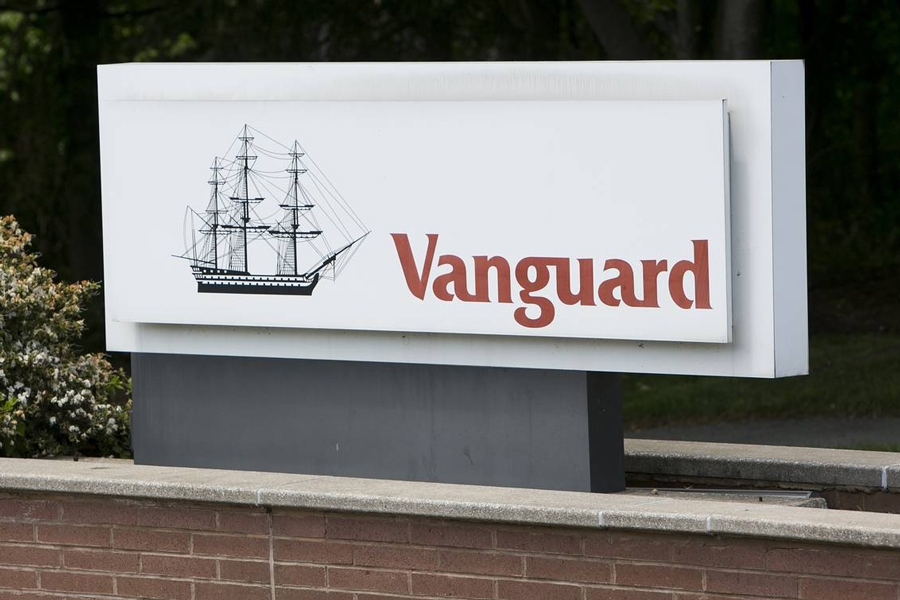

Vanguard gobbled up even more of the target-date fund market last year, and is nearing $1 trillion managed in those products, according to a report from Sway Research.
With $862 billion in target-date assets at the end of the year, the asset management giant oversees 38% of the $2.3 trillion target-date market. That’s up a third from the $649 billion Vanguard managed at the end of 2018, when it oversaw 37% of all U.S. target-date assets, excluding custom products, according to the research. Those figures, which include assets in mutual funds and collective investment trusts (CITs), are up from $356 billion in 2015.
By comparison, Vanguard’s share of the target-date fund market was 32% at the beginning of 2016, according to Sway.
The reason behind that rise is something familiar to nearly all plan sponsors — fees, said Chris Brown, principal of Sway. Advisers often pitch 401(k) plan designs that include Vanguard target-date funds “as a means to lower cost,” Mr. Brown said.
“It’s a huge savings. You can immediately knock a lot of the costs right out of the plan,” he said.
For plan sponsors, that is meaningful. Investment management fees are among the top factors considered when selecting or retaining target-date funds, second slightly to portfolio construction, according to a recent survey by Callan.
Adviser Chris Thixton, principal with Pension Consultants Inc., said he sees two themes driving target-date sales within defined-contribution plans: fees and choice between passive and actively managed underlying funds.
“Our research has shown that high costs don’t provide results,” Mr. Thixton said, noting that his firm does not recommend Vanguard’s target-date funds to plan clients. But, he said, “fees without results are meaningless.”
His firm includes Vanguard funds in their research process, as well as funds from other low-cost providers, after an initial screening, he said.
“We stay away from having cheap for the sake of showing cheap,” he said. That allows the firm to recommend, if necessary, target-date series that primarily hold actively managed funds, he said.
Nonetheless, the trend toward lower costs in 401(k) plans has benefited index-fund based target-date series across the market, Mr. Brown said. And fund providers that have an affiliated record-keeping business have a distinct advantage — a big reason why Vanguard, Fidelity Investments and T. Rowe Price are the largest target-date fund managers and collectively account for 63% of the market, according to Sway.
While just over half of target-date products are sponsored by companies that have their own record-keeping businesses, those same firms manage 85% of target-date assets, the report noted.
Lowering fees
The trend toward lower fees has also favored the use of collective investment trusts, Mr. Brown said. Since 2015, total assets in target-date CITs have increased by an average annual rate of 27%, compared with just 16% for target-date mutual funds, according to the report. In all, about 40% of target-date assets are now in CITs.
That trend has particularly benefitted one firm — NFP, Mr. Brown said. NFP, which only provides target dates in CIT form, was the 28th largest manager of target-date assets in 2015 but was the 14th largest as of the end of 2019, he said.
To try to win over investors through low costs, numerous investment providers have added “hybrid” series that hold a mix of active and passive underlying investments. As of 2019, about 30% of target-date products fell into the hybrid category, but sales have not followed, according to Sway. Those products represented 8% of target-date assets last year, behind active series (36%) and passive ones (55%).
“It really still comes down to price,” Mr. Brown said. “Vanguard is winning the passive war. And if plans are using funds that are active, it’s American Funds.” Total assets in American Funds’ target dates increased by about 50% year over year, hitting $155 billion, up from $104 billion at the end of 2018, the report shows.
Another category that has struggled is multimanager target-date suites, which invest in a mix of funds managed by third parties. These products accounted for only 3.5% of target-date assets as of 2019, according to Sway.
“Nobody seems to care that it’s all one firm managing all these funds underneath,” Mr. Brown said.

Rajesh Markan earlier this year pleaded guilty to one count of criminal fraud related to his sale of fake investments to 10 clients totaling $2.9 million.

From building trust to steering through emotions and responding to client challenges, new advisors need human skills to shape the future of the advice industry.

"The outcome is correct, but it's disappointing that FINRA had ample opportunity to investigate the merits of clients' allegations in these claims, including the testimony in the three investor arbitrations with hearings," Jeff Erez, a plaintiff's attorney representing a large portion of the Stifel clients, said.

Chair also praised the passage of stablecoin legislation this week.

Maridea Wealth Management's deal in Chicago, Illinois is its first after securing a strategic investment in April.
Orion's Tom Wilson on delivering coordinated, high-touch service in a world where returns alone no longer set you apart.
Barely a decade old, registered index-linked annuities have quickly surged in popularity, thanks to their unique blend of protection and growth potential—an appealing option for investors looking to chart a steadier course through today's choppy market waters, says Myles Lambert, Brighthouse Financial.
